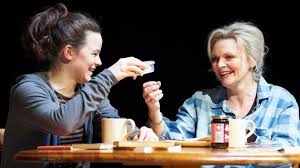Every Third Minute. a festival at West Yorkshire Playhouse charting resilience against dementia, was launched with the warming ‘Still Alice’. Arts writer Catherine Corcoran gives us the rundown.
First performed in 2013 by Chicago’s Lookingglass Theatre Company, Christine Mary Dunford’s touching work Still Alice has now arrived at the West Yorkshire Playhouse. The play opens the gates for the playhouse’s Every Third Minute programme, a festival taking place until March 31st which champions powerful narratives of resilience in dementia. The true pleasure of Still Alice lies in its warming narrative and ability to explore Alzheimer’s with such familiar nuance.
The play tells the story of Alice (Sharon Small), a professor of neuroscience at Harvard University. After being diagnosed with early-onset dementia, Alice, her husband John (Dominic Mafham) and their children Thomas and Lydia (Andrew Rothney and Alaïs Lawson) must rethink how their lives can work around this bewildering disease. Whilst we witness the family negotiate care and responsibility, Alice’s world is crumbling apart. As her memories fade, Jonathan Fensom’s set progressively deconstructs until we are left with an almost blank stage, providing a beautifully gradual representation of Alice’s loss.
Theatricising an illness as complex and misunderstandable as dementia is a mammoth task, and what’s most striking about Still Alice is the huge amount of effort put in by director, David Grindley, to truly understand the disease throughout the theatre-making process. Not being a sufferer himself, it would have been easy for Grindley to fall into the realms of the abstract to vaguely portray this confusing disease, giving the play little voice on the everyday realities of Alzheimer’s. Instead, he and the cast worked with Wendy Mitchell, a sufferer of young-onset dementia and author of Somebody I Used to Know, whose first-hand experience and input on the play has enhanced its ability to paint a truthful image of what it’s like to live with Alzheimer’s: ‘She can look at what we’ve done and say: “Well, in my experience, that decision is wrong.”’
The result of this attention to detail is unprecedented. Still Alice is homely, familiar and down-to-earth, emphasising the everyday pressures that arise from dementia over the big questions about what it means to lose our sense of self. We see Alice forget how many eggs go into her signature dessert, miss her lunch date with her son and become incredibly frustrated when she can’t find the words to ask her daughter to pass the cream cheese. These menial cases of memory loss establish the simplistic familiarity of the play, welcoming us into the world of Alice and her family before that world starts to crumble away.
Nonetheless, Dunford’s intriguing use of Herself (Ruth Gemmell) as a dualistic partner to Alice throughout much of the play interweaves more complex themes of identity within the main plot. Whilst Alice is relatively healthy, she and Herself maintain close proximity, chatting and bickering when others are out of the room. As Alice’s dementia intensifies, the pair put their heads together to try and work out what’s going on in Alice’s confusing life; there’s a heartwarming moment where they work as a team to locate the ‘Butterfly’ document on Alice’s computer, a file she wrote when healthy minded to give her future self instructions in the event of forgetting key details about her life. Distressing yet painfully understandable, the contents of this file provide Alice with a brutal reminder of how she can make a quick escape from her heartbreaking demise.
Whilst Alice’s grand speech at Harvard University towards the end of the play provides some break from the distressing scenes where she is childish and totally confused, it unfortunately taints the realisticity of her story. Still Alice’s true charm lies in its light comedy and portrayal of a family brought closer by dementia, and this fantastical display of publicised resilience feels out of place and a diversion from the play’s key ideas. Nevertheless, Still Alice is a fantastic piece of theatre that has opened Every Third Minute with a bang. I’m looking forward to seeing how the festival progresses as the month goes on.
Katherine Corcoran
(Image courtesy of The Times)

